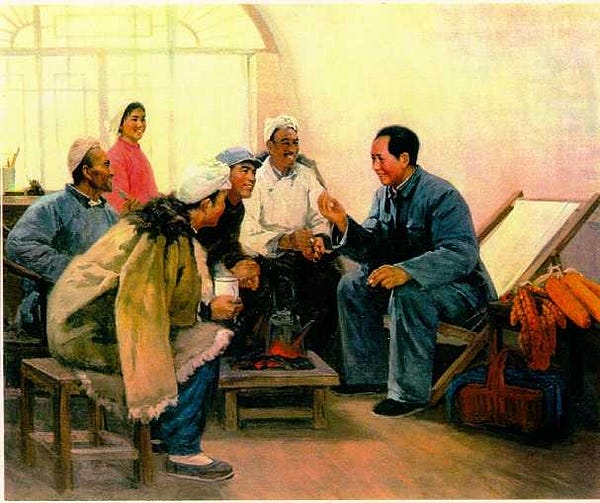The world is almost 20 years into the 21st century, and the neoliberal reforms of the post-Cold War era have transformed global capital into a new beast that is unlike the system that was experienced by political theorists like Engels or Althusser. The face of capital today is virtually incomparable to the system of 40 years ago.
Despite this noticeable change, Marxist organizations in the United States have failed to adapt to meet the current conditions. The United States is entering a renewed period of heightened class struggle, and yet, Marxist groups continue to squabble among themselves. There is no mainstream communist movement that can serve as a tangible alternative to the Liberal democratic system. Why have none of the established organizations made serious ground?
As self-proclaimed Marxists, it is important to bite the bullet and take a hard look at the inability to organize a wide-spread worker’s movement to seize the reins of power. As Chairman Mao said, a Marxist “must bring his ideas into correspondence with the laws of the objective external world; if they do not correspond, he will fail in his practice. After he fails, he draws his lessons, corrects his ideas to make them correspond to the laws of the external world, and can thus turn failure into success.”
This collective failure can be attributed to a great ideological mix-up that has gripped the leadership of the contemporary American left. The crushing defeat the movement suffered, with the collapse of the socialist camp in the 80/90s, was a shock to the core of every anti-capitalist, whether they admit it or not. Rightfully so, groups went back to the drawing board. The issue is, however, they stayed at the board so long that they shifted their dialectic to one where the idea affects the material.
Currently, these communist organizations are focused primarily on party-building through (mostly) recruitment and conducting educational work to raise the level of class consciousness among the working class. Both tasks are important in their own right, but they rely upon the premise that the primary hurdle to worker power is ideology.
There is no emphasis on addressing the material conditions of the masses. Such parties believe that the contradictions of capitalism are not sharp enough to give rise to class consciousness. They seek to combat false class consciousness with their own interpretation of what the masses should believe, not what they innately believe.
At no point will a strategy based upon imposing the “correct” ideological line find fertile soil. This is the core of the dialectical confusion. As Marxists, it is understood that the material affects the idea. The superstructure (ideology, government, culture, and so on) is a reflection of the base (mode of production).
To link oneself with the masses, one must act in accordance with the needs and wishes of the masses. All work done for the masses must start from their needs and not from the desire of any individual, however well-intentioned. It often happens that objectively the masses need a certain change, but subjectively they are not yet conscious of the need, not yet willing or determined to make the change. In such cases, we should wait patiently. We should not make the change until, through our work, most of the masses have become conscious of the need and are willing and determined to carry it out. Otherwise we shall isolate ourselves from the masses. Unless they are conscious and willing, any kind of work that requires their participation will turn out to be a mere formality and will fail…. There are two principles here: one is the actual needs of the masses rather than what we fancy they need, and the other is the wishes of the masses, who must make up their own minds instead of our making up their minds for them. -Chairman Mao
Worker’s power cannot be built by waging a sectarian ideological war. No party line is so refined, and no party is so disciplined that the ideas, formed as a reflection of the present economic reality, can be swept aside.
For an organization to be successful, it needs to act as a conduit for what the masses already desire. What do the masses desire? The people are fed up with the contradictions of capital that destroy their lives, invalidates their political voice, and makes things harder than they need to be.

To address material conditions means to go to the people, in a very literal sense (door to door as individuals), and find what they need. The needs of the working class are a direct reflection of their day-to-day lives. The correct line is the Marxist accommodation of what the majority of folks want to be changed. Does this mean more jobs? Does this mean more community involvement in who gets to invest in their town? Does this mean fixing the potholes that haven’t been filled for 30 years?
Class consciousness is raised when the people become confident and unafraid to speak their minds. When the average working American sees their needs being met, and they see that what they want actually works, they begin to see that they don’t need some rich lawyers to run their affairs.
How many ordinary Americans actually trust the government, and how many people think that Congress actually represents their interests? There is already a widespread desire for a new democratic society. All that stands in the way is to build it. How this would look depends on how far the community is willing to express independent political power. Neighborhood councils to associations dedicated to seeking reforms, alternative institutions of power are a natural outgrowth of empowerment. People who want to control their lives will find a way to do it.
Marxism provides the toolset to address the people’s needs. A communist organization functions to empower the working class, and give them the tools needed to build a worker’s state.
